 Education is changing. Again. This time, it’s not about iPads and Chromebooks; it’s 1:1 computing. More than 50% of teachers report they have one computer for every student (on average) and that changes for the better every year. Digital devices, be they iPads, laptops, Chromebooks, Macs, or PCs, give students access to endless amounts of web-based resources for research, inquiry, collaboration, sharing, and more. Schools are no longer reliant on years-old (or decades-old) textbooks written for the average student, whoever that is. It has become increasingly possible to personalize learning–adapt resources and assessments to student skills and needs and differentiate lessons that are pushed out to individual students or small groups (read: Shifting my Teacher Mindset with Micro-credentials).
Education is changing. Again. This time, it’s not about iPads and Chromebooks; it’s 1:1 computing. More than 50% of teachers report they have one computer for every student (on average) and that changes for the better every year. Digital devices, be they iPads, laptops, Chromebooks, Macs, or PCs, give students access to endless amounts of web-based resources for research, inquiry, collaboration, sharing, and more. Schools are no longer reliant on years-old (or decades-old) textbooks written for the average student, whoever that is. It has become increasingly possible to personalize learning–adapt resources and assessments to student skills and needs and differentiate lessons that are pushed out to individual students or small groups (read: Shifting my Teacher Mindset with Micro-credentials).
To do that requires competencies most teacher training programs never considered. As a result, an increasing number of schools are making micro-credentials a fundamental piece in their professional development plan.
What are Micro-credentials?
Micro-credentials are short, low-cost, focused, online classes that are self-paced and student-driven, offering competency-based recognition for skills educators want to learn to buttress their teaching.
Because they aren’t long tedious seminars, expensive college classes, or comprehensive certificate courses, they were ignored by administrators in the past. Not anymore.
Micro-credentials enable educators to better meet the needs of increasingly diverse student populations and school districts who want to shift professional learning from broad topics to competency, from seat-time to knowledge, from sporadic seminars to acknowledgment that teachers are life-long learners. Because they’re authentic and practical, micro-credentials result in powerful, personalized, skills-driven learning for students.
Four primary characteristics of micro-credentials are:
- competency-based. Teachers pick specific skills that fill the holes in their education toolkit. They learn these topics and then demonstrate competency via varied forms of assessment.
- on-demand. Most (all?) are offered online in a self-paced environment. Educators can start anytime and continue at their own schedule, their own pace, on their own time. Teachers spend as much or as little time as they have available, finish when they can.
- personalized. Educators create a professional learning journey aligned with their specific needs by selecting only the micro-credentials that fit their plan.
- shareable, with evaluators, posted on social networks, displayed within the schools learning management system (LMS), curated on professional blogs, and added to resumes to demonstrate the educator’s specific skillset.
One of the leaders in this field is Digital Promise.
Who is Digital Promise?
In partnership with groups such as Verizon Innovative Learning Schools and the Dynamic Learning Projects (with Google), as well as numerous school districts, Digital Promise has become a prominent provider of micro-credentials to educators. Their ecosystem includes educators, content developers, districts and state-level educational agencies. They offer over three hundred micro-credentials addressing all levels of personal learning (more on that later).
How Do Digital Promise’s Micro-Credentials Work?
Digital Promise micro-credentials are available individually or as part of a collection–called a Stack. Each Digital Promise micro-credential:
- focuses on a single competency
- is supported by research
- requires evidence of competence
- includes a rubric for evaluation
They are offered through Bloomboard, a well-respected pioneer in the micro-credential field. Here’s how you get started:
- Register at Bloomboard.
- Select a specific skill or area.
- Complete the requirements by collecting the required evidence. This will vary between topics.
- Submit the evidence through the online platform.
- Wait while assessors review the evidence. If you successfully demonstrate competence, you will receive the micro-credential in the form of a digital badge.
How Micro-credentials Support English learners
Perhaps one of the most critical areas in today’s education landscape, and an area where Digital Promise micro-credentials are making an immediate impact, is supporting English learners. According to the National Center for Education Statistics, an average of 9 percent of students in U.S. public schools are English Language Learners (ELLs). Other surveys report this as high as 5 million students–12 percent of the total US school population. With 14 million new immigrants arriving in the United States in the last ten years. English language learners are the fastest growing group of students with an increase of over 70% since the early 1990s. Despite this, the predominance of teachers possess little training in effective methods for supporting English learners.
Digital Promise offers ten micro-credentials that specifically focus on supporting English learners:
- Language Fundamentals – Role of Language in Content Learning
- Constructive Conversations – Assessing Student Conversations
- Constructive Conversations – Helping Students Clarify and Support Ideas
- Constructive Conversations – Creating Effective Conversation Prompts
- Mathematical Language Routines – Facilitating Student Ideas and Language: Stronger and Clearer Each Time
- Mathematical Language Routines – Developing Student Abilities to Critique and Clarify the Reasoning of Others
- Mathematical Language Routines – Designing and Using Information Gap Activities
- Supporting Student Argumentation – Understanding Structure and Language of Argumentation
- Supporting Student Argumentation – Helping Students Evaluate Evidence in Arguments
- Supporting Student Argumentation – Fostering the Language of Argumentation
Each includes three components:
- About the micro-credential: This is a summary of the micro-credential including some or all of the following pieces: an overview, key methods, preparation, engaging in the task, formative assessment, discussion, analysis, reflection, conclusions, and/or other components as fits the topic.
- Research and resources: This includes videos, readings, and other resources as fit the topic
- Submission requirements: This includes guidelines, evaluation criteria, overview questions, work examples/artifacts, and reflection.
The ten topics above are also curated into four stacks of lessons. ‘Stacks’ are related content that support and scaffold the topic. These four stacks are:
1. Constructive Conversations https://goo.gl/jfdB7t 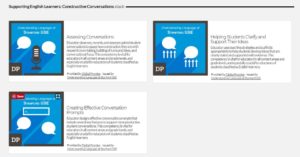
Constructive Conversations includes three micro-credentials (offered by Understanding Language at Stanford GSE):
Assessing Conversations: Educator observes, records, and assesses paired student conversations to gauge how constructive they are with respect to turn-taking, building of turns and ideas, and conversational focus. This competency is vital for educators in all content areas and grade levels, and especially crucial for educators of students classified as English learners.
Helping Students Clarify and Support Their Ideas: Educator uses teaching strategies and scaffolds appropriately to help students develop ideas that are clearly stated and supported with evidence. This competency is vital for educators in all content areas and grade levels, and especially crucial for educators of students classified as English learners.
Creating Effective Conversation Prompts: Educator designs effective conversation prompts that include several key features to support more productive student conversations. This competency is vital for educators in all content areas and grade levels, and especially crucial for educators of students classified as English learners.
2. 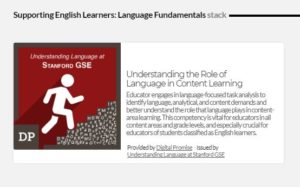 Language Fundamentals https://goo.gl/ieK3f4
Language Fundamentals https://goo.gl/ieK3f4
3. Mathematical Language Routines https://goo.gl/1gbfUK
Mathematical Language Routes includes three micro-credential:
Stronger and Clearer Each Time: Educator supports students in improving their ideas by designing and facilitating an activity in which students share and improve upon ideas with multiple peers. This competency is vital for educators in all content areas and grade levels, and especially crucial for educators of students classified as English learners.
Designing and Using Information Gap Activities: Educator designs and uses activities that have information gaps, which means that each student brings unique information to the conversation and wants or needs to share it with others in order to accomplish a meaningful task. This competency is vital for educators in all content areas and grade levels, and especially crucial for educators of students classified as English learners.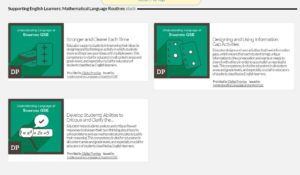
Develop Students’ Abilities to Critique and Clarify the Reasoning of Others: Educator helps students analyze and critique flawed responses to sharpen their own thinking about how to solve problems and use mathematical principles to justify their reasoning. This competency is vital for educators in all content areas and grade levels, and especially crucial for educators of students classified as English learners.
4. Supporting Argumentation https://goo.gl/PZ3rvJ
Supporting Argumentation includes three micro-credentials:
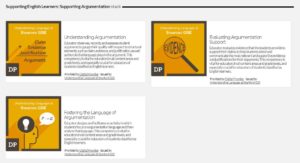 Understanding Argumentation: Educator observes, records, and assesses student arguments to gauge their quality with respect to structural elements, such as claim, evidence, and justification, as well as the role that language plays in the argument. This competency is vital for educators in all content areas and grade levels, and especially crucial for educators of students classified as English learners.
Understanding Argumentation: Educator observes, records, and assesses student arguments to gauge their quality with respect to structural elements, such as claim, evidence, and justification, as well as the role that language plays in the argument. This competency is vital for educators in all content areas and grade levels, and especially crucial for educators of students classified as English learners.
Evaluating Argumentation Support: Educator evaluates evidence that the students provide to support their claims, to help students select and communicate the most relevant and supportive evidence and justifications for their arguments. This competency is vital for educators in all content areas and grade levels, and especially crucial for educators of students classified as English learners.
Fostering the Language of Argumentation: Educator designs and facilitates an activity in which students focus on argumentation language and then analyze that language. This competency is vital for educators in all content areas and grade levels, and especially crucial for educators of students classified as English learners.
Note: The links take you to the item in a curated list. If you don’t see it, use Ctrl+F to search for the topic.
***
All Digital Promise micro-credentials are designed to take educators through their instructional practices to recognize the role they play in students’ ability to leverage language to access content. While each micro-credential is unique in its distinct focus, all require educators to reflect on how their instruction influences actual student language use and development – an invaluable skill for today’s educators who lead increasingly complex and diverse classrooms.
For more information, contact Digital Promise at these social media links:
Twitter: @Digital Promise https://twitter.com/digitalpromise
Facebook @DigitalPromise https://www.facebook.com/digitalpromise
Pinterest: @DigitalPromise https://www.pinterest.com/digitalpromise/
Instagram: @DigitalPromise https://www.instagram.com/digitalpromise
–Though this post is sponsored by Digital Promise, all opinions are my own.
More on micro-credentials:
Transforming the Classroom with Micro-credentials
Supporting English Language Learners
Jacqui Murray has been teaching K-18 technology for 30 years. She is the editor/author of over a hundred tech ed resources including a K-12 technology curriculum, K-8 keyboard curriculum, K-8 Digital Citizenship curriculum. She is an adjunct professor in tech ed, Master Teacher, webmaster for four blogs, an Amazon Vine Voice, CSTA presentation reviewer, freelance journalist on tech ed topics, contributor to NEA Today, and author of the tech thrillers, To Hunt a Sub and Twenty-four Days. You can find her resources at Structured Learning.

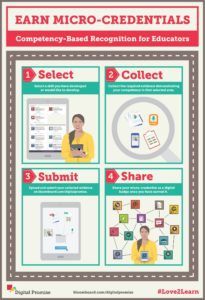


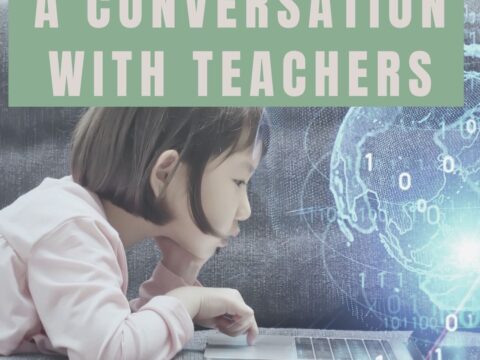
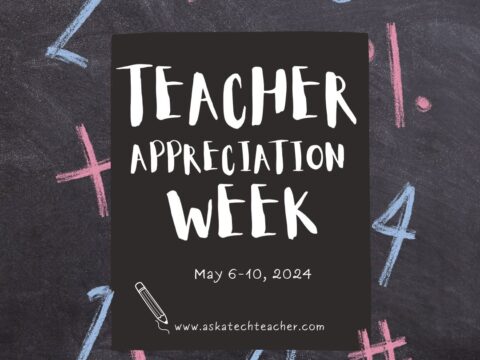































3 thoughts on “Support English Learners with Micro-credentials from Digital Promise”
Comments are closed.